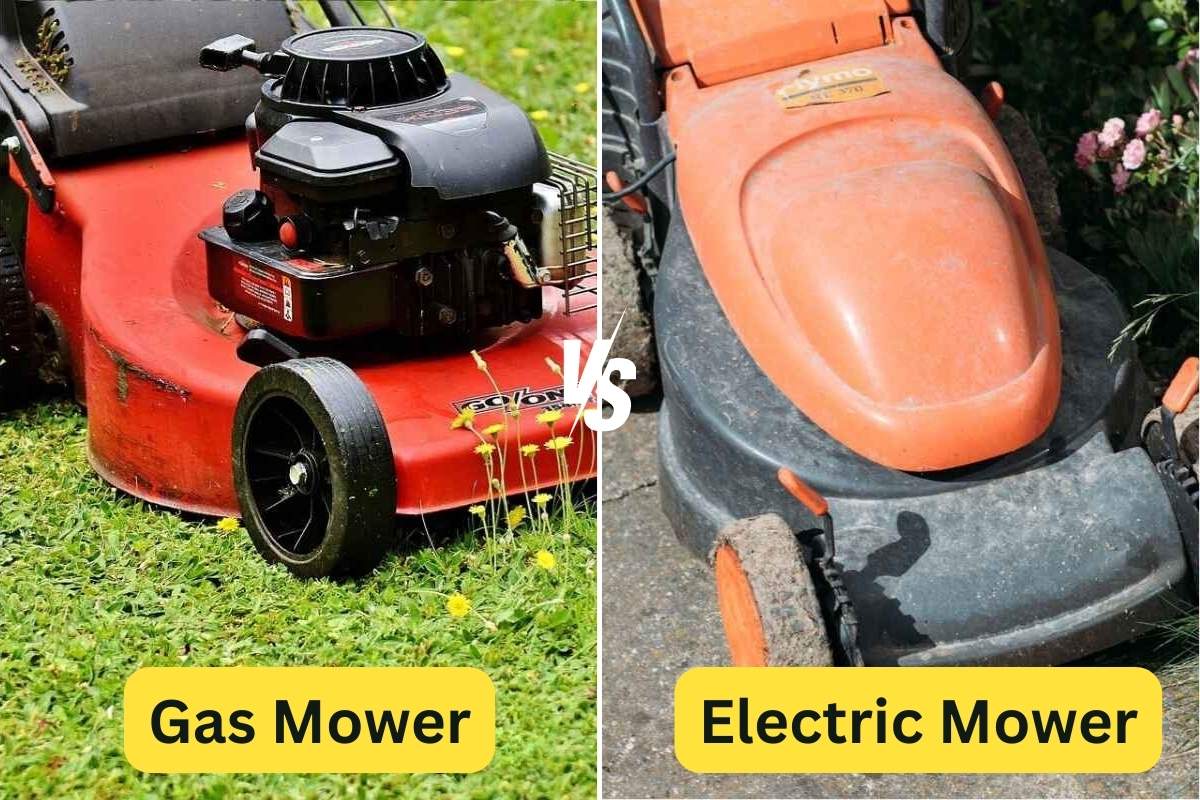
When comparing gas vs. electric lawn mowers, power source is not the only consideration. You must also check other features like ease of use, noise level, maneuverability, and cost.
Gas lawn mowers are better than electric lawn mowers in some categories, and vice versa. For example, gas mowers are easier to use when mowing large, uneven lawns or overgrown grass, while electric mowers are easier for mowing small, flat lawns.
To help you choose the right type of mower for your lawn, we’ll explain more about the advantages and disadvantages of each. To learn which type works best in key categories, check out our section on How to Choose the Right Mower for You.
The Different Types of Lawn Mowers
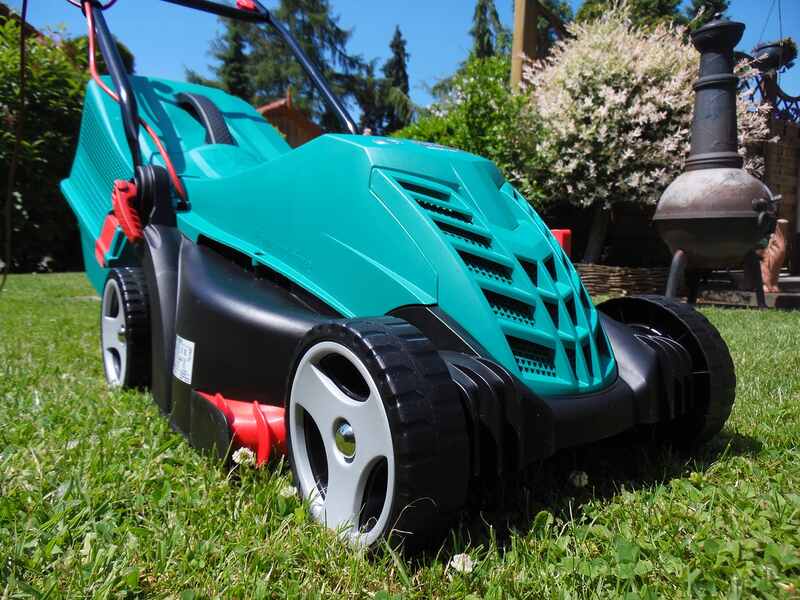
Maintaining a beautiful and healthy lawn requires the right type of lawn mower. Similar to cars, lawn mowers are also powered by either gas or electricity/battery:
- Gas lawn mowers run on gasoline and have longer runtimes.
- For electric lawn mowers, you have a choice between battery-powered and corded. Battery mowers get their power from rechargeable batteries, while corded electric mowers must be plugged into an electrical outlet.
Here’s a quick overview of both gas and electric (battery-powered and corded) lawn mowers:
| Mower Type | Key Features |
| Gas | ➠ Requires fuel ➠ Longer runtimes ➠ Pull-cord start mechanism ➠ Weighs around 60 to 150 lbs. ➠ Maneuvers better on uneven terrain ➠ Engine power ranges from 140cc to 200cc ➠ Operating noise level can reach 95 to 105 decibels |
| Battery-powered | ➠ More lightweight than gas mowers (around 50 to 80 lbs.) ➠ Runs on rechargeable lithium-ion batteries ➠ Charging can take 30 minutes to 5 hours ➠ Runtime from 30 to 90 minutes ➠ Push-button start mechanism ➠ Quiet (65 to 75 decibels) |
| Corded electric | ➠ Easy to push and maneuver ➠ Doesn’t need refueling or recharging ➠ Push-button or lever start mechanism ➠ Requires a heavy-duty outdoor extension cord (12 to 14 gauge) ➠ More lightweight than gas and battery-powered mowers (35 to 55 lbs.) |
Note: Choosing the right type of mower can be overwhelming. Then think about the work it takes to mow your grass, especially if you have a large lawn. To avoid it all, hire a lawn care professional with the right equipment and skill to cut your grass.
See Related:
- Self-Propelled vs. Push Mowers
- 8 Best Lawn Mowers [Reviews]
- How Much Does Lawn Mowing Cost?
- Reel Mower vs. Rotary Mower
Gas Lawn Mowers
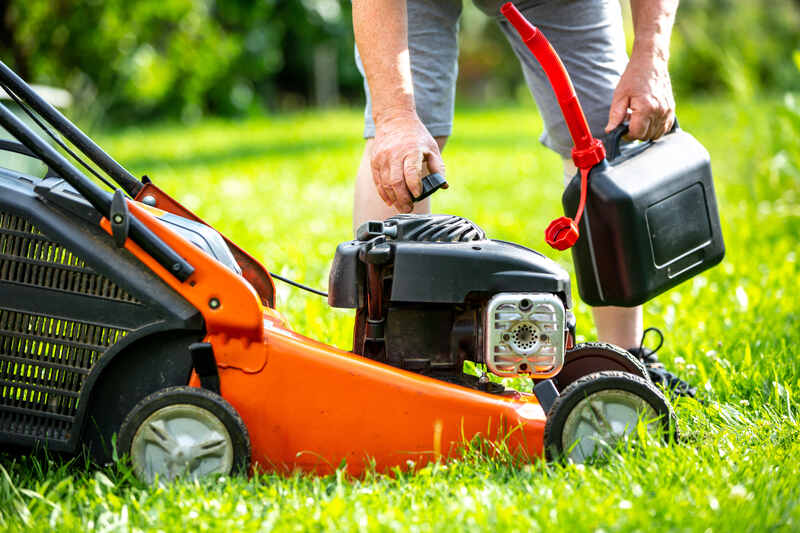
This is your traditional lawn mower, with its iconic roaring sound and slightly pungent gasoline odor. While gas mowers can be heavy and loud, they run continuously until it’s time to refuel. And if you have uneven terrain, this type of mower is your best option.
See Related: 7 Best Gas Lawn Mowers [Reviews]
Advantages of Gas Lawn Mowers

Apart from having better mobility than corded electric mowers, a gas lawn mower can also easily handle tough grass that can be difficult to cut for some electric mowers.
Many homeowners prefer using gas mowers for these key benefits:
- Superior Cutting Power: Its gas engine generates considerable torque, spinning the blades at high speed and effectively cutting through thick grass.
- Durability and Longevity: With proper care and regular maintenance, gas mowers can last between 8 and 10 years. Plus, they’re built to handle rough terrain.
- Unlimited Runtime: A gas-powered mower can run for longer periods. If it runs out of fuel, let the engine cool, then refill the gas tank and start mowing again.
- Wider Cutting Paths: With 20- to 22-inch cutting widths for gas push mowers and 32 to 60+ inches for zero-turn mowers, gas mowers are more efficient for mowing large lawns with fewer passes.
Note: Gas mowers can have different fuel tank capacities. For example, walk-behind mowers can have a capacity of 0.25 gallons, while single-cylinder lawn tractors can accommodate around 1.5 to 2.5 gallons of gas.
Disadvantages of Gas Lawn Mowers
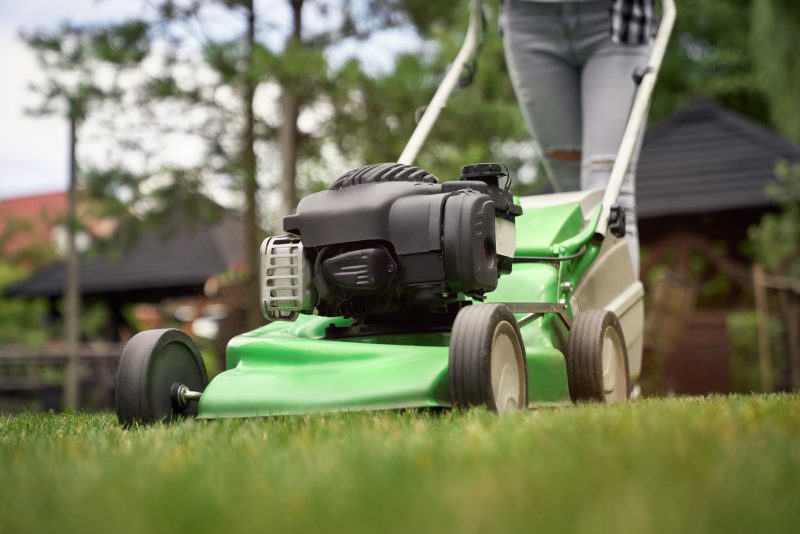
Before rushing to the store to buy a gas lawn mower, remember that it also has drawbacks:
- High Maintenance: Apart from having to refill gas, you’ll also need to replace the air filter periodically. Also, fuel can go stale after some time, engine oil can lose its lubricating properties, and even the carburetor can get clogged. After mowing season, you’ll also need to drain the gas from your lawn mower before storing it for winter.
- Loud Noise: A gas lawn mower produces a lot of noise, especially two-stroke engines which are more high-revving than four-stroke engines. And its small muffler contributes to the loud exhaust. Plus, the vibration from the engine and spinning blades can amplify the noise.
- Environmental Impact: A gas lawn mower emits harmful air pollutants like carbon monoxide and volatile organic compounds (VOCs) that contribute to smog and climate change. These emissions may also cause or worsen respiratory issues, especially in densely populated areas.
- Higher Operating Cost: Ongoing expenses for fuel, regular oil changes, spark plug replacements, and air filter replacements can add up.
Pro Tip: To avoid frequent gas refills, use a gas mower with a higher fuel tank capacity. You’ll need around 0.5 to 1 gallon of gas per acre if you’re using a typical 21-inch gas mower with a 140cc engine.
Note: As part of the California green lawn care law, the state banned the sale of new gas mowers in early 2024. So, if you’re a resident of California, you won’t be able to purchase a new gas mower from a store.
See Related:
- DIY Lawn Mower Maintenance Guide
- How to Winterize Your Lawn Mower
- How Much Does Lawn Mower Repair Cost?
Electric Lawn Mowers
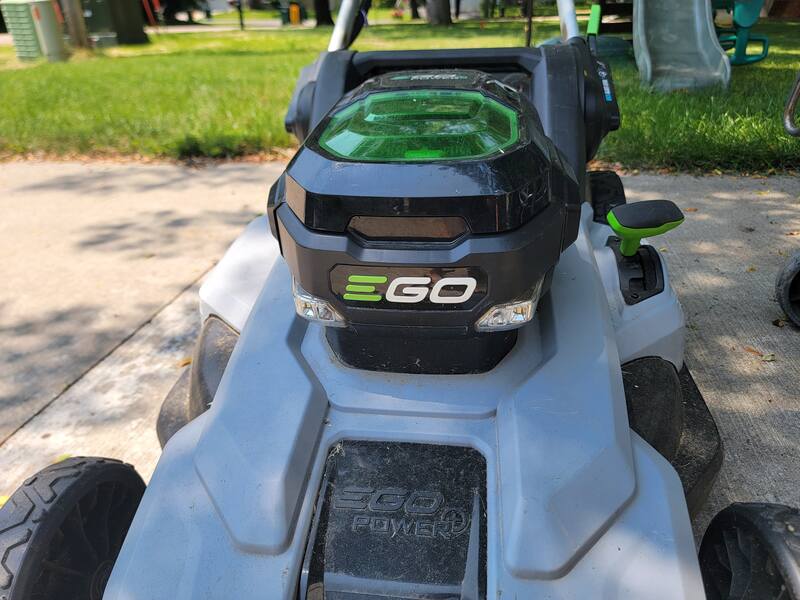
Instead of gasoline, you need electricity to power this type of lawn mower. Depending on your needs, you can use either a battery-powered or a corded electric lawn mower.
- Battery-powered lawn mower: This is the type of lawn mower powered by rechargeable lithium batteries. A battery lawn mower is easy to maneuver since it has no cord to limit movement.
- Corded electric lawn mower: Homeowners with small urban yards still use this type of mower since it’s budget-friendly. But it’s not advisable to use corded mowers in large yards due to the limited range. Plus, they can be hard to use in landscapes where the cord can get tangled.
See Related:
Advantages of Electric Mowers
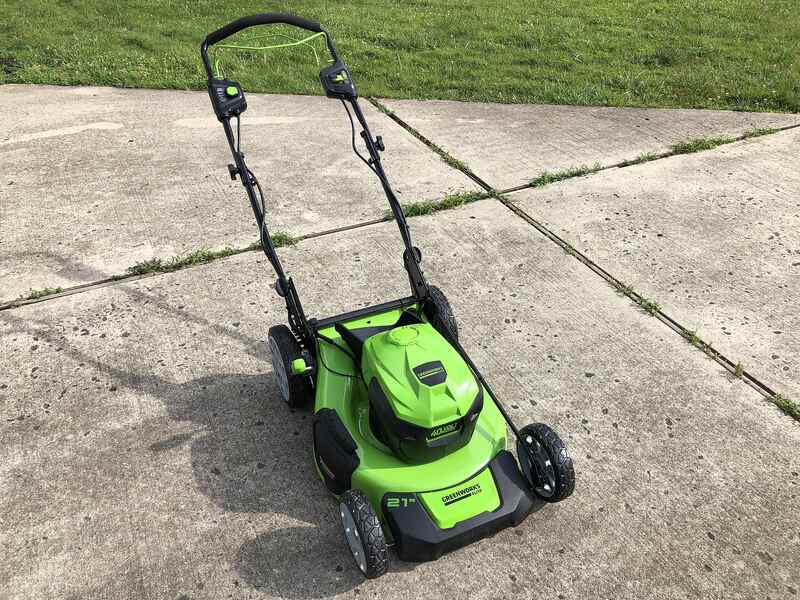
The growing popularity of electric mowers is due to their many advantages, such as lower upkeep, ease of use, and environmental benefits.
- Low Maintenance: You’ll only need occasional blade sharpening and lubrication to maintain your electric mower.
- Easy to Use: An electric lawn mower is almost the same as a vacuum cleaner — it’s just plug-and-go. And with no heavy fuel engines, electric mowers are lightweight, making them easy to navigate around obstacles and tight corners.
- Quiet Operation: Since an electric mower doesn’t have a loud combustion engine, it produces significantly less noise (up to 75 decibels, which is similar to a washing machine). According to the National Institute on Deafness and Other Communication Disorders, sounds up to 70 decibels are generally considered safe.
- Environmental Benefits: Electric lawn mowers don’t produce greenhouse gases or air pollutants during operation, contributing to cleaner air quality.
- Easier to Start (Push Button): Electric lawn mowers only require pressing a button to start. With most gas mowers, you’ll need to exert more physical effort to pull a cord to start the engine.
- Lower Maintenance Cost: Electric mowers have fewer parts that wear out. Plus, they don’t need regular oil changes, carburetor cleaning, or air filter replacements.
- Weight and Storage: Typically around 35 to 80 pounds, electric mowers are lighter than gas types, which weigh between 60 and 150 pounds, depending on the model. This makes them easier to lift and store.
Pro Tip: Similar to your iPhone’s battery (which you should charge once it goes down to 20%), your mower battery can get damaged if you let it drain completely. To prolong the lifespan of your lawn mower’s battery, avoid draining it and charge it before it drops below 20%.
See Related: 10 Best Lawn Mowers for Small Yards [Reviews]
Disadvantages of Electric Mowers
Electric lawn mowers are not the be-all and end-all of lawn mowing machines. They also have drawbacks that deter some homeowners and lawn care professionals.
- Limited Runtime (Battery): The runtime of a battery mower depends on the battery’s voltage and size. A mower with 20-volt batteries usually runs between 20 to 30 minutes, while electric riding mowers with 40-volt batteries can be operated continuously for 40 to 60 minutes.
- Restricted Range (Corded): Electric mowers need extension cords, which are only up to 100 feet long. Since you can only operate your mower within this distance, it would be impossible to use it in large yards. And even if you have a small lawn, you risk running or tripping over the extension cord while mowing.
- Not as Powerful: Since gasoline has a higher energy density, electric motors cannot produce the same level of raw power as gas engines.
- Battery Replacement Cost: Batteries typically last 3 to 5 years, but recharging them more often results in a shorter lifespan. Depending on the type and brand, battery replacements can cost anywhere from $40 to $240 per battery.
See Related:
How to Choose the Right Mower for You
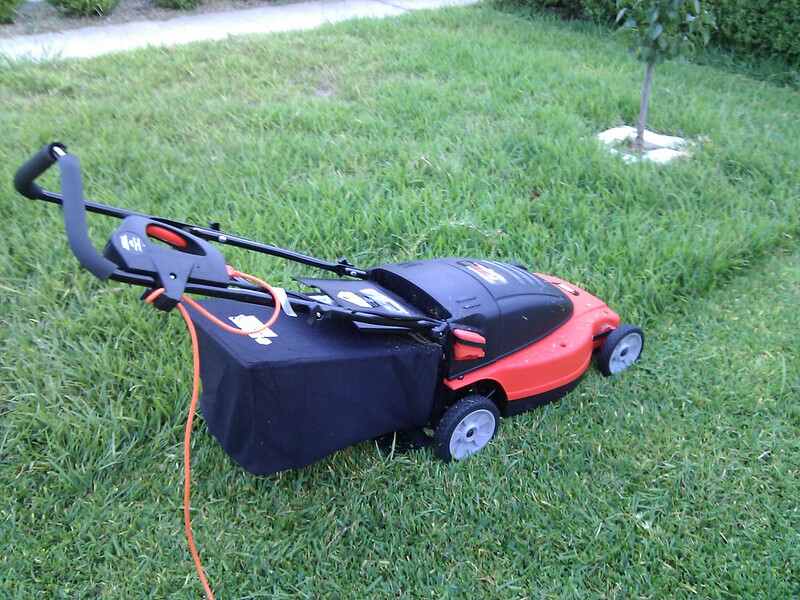
If you still can’t decide which type of lawn mower to use on your lawn, here’s a quick overview of which mower is best depending on various factors:
| Factor | Best Mower Type |
| Lawn size | Large lawns: Gas mowers have longer run times. Small lawns: You can use an electric mower if you have easy access to an electrical outlet. |
| Ease of use | Electric mowers are easier to start, operate, and maneuver. |
| Terrain | Gas mowers have greater horsepower for mowing in challenging terrain. |
| Storage | Electric mowers are lightweight and easy to lift and store. |
| Location | Urban: Electric mowers are suitable for cities with strict policies on noise pollution or gas emissions. Suburban and rural: Gas mowers can suffice if noise is not an issue. |
| Budget | More affordable upfront: Gas mowers are more affordable upfront, but running costs make them more expensive over time. Lower maintenance costs: Electric mowers have a higher price tag but lower maintenance costs. |
See Related:
FAQ About Gas vs. Electric Lawn Mowers
In general, electric lawn mowers last 5 to 10 years. Depending on the usage and the unit’s brand and model, you might need to replace the battery every 3 to 5 years.
No, it’s not safe to cut wet grass with an electric mower since water can affect the battery and electrical components.
Yes, it can be hard to get electric mowers serviced, as not all service repair shops have the same level of expertise in fixing electric mowers. It’s best to check with the manufacturer. They usually have authorized repair technicians who can handle complex lawn mower repairs.
Use the Right Type of Lawn Mower
Choosing the best type of lawn mower for your lawn is easy if you know the pros and cons of each type. It’s just the first step, though. You must commit to mowing your lawn regularly and properly. Not up to the task? No worries, as you can always hire a lawn care pro to keep your lawn beautiful with no effort on your part.
Read More: The History of Lawn Mowers
Sources:
- “100+ and Counting: Transitioning Away from Gas-Powered Lawn Equipment.” PennEnvironment.
- “Cities and States with Restrictions on Gas-Powered Lawn Equipment.” TexPIRG Education Fund.
- “Do You Know How Loud is Too Loud?” National Institute on Deafness and Other Communication Disorders.
- “Updated Regulations on Zero Emission.” California Air Resources Board.
Main Image Credits:
Gas: Alexas_Fotos / Pixabay
Electric: Ivan Radic / Flickr / CC BY 2.0, created using Canva Pro

![9 Best Electric Lawn Mowers of 2024 [Reviews]](https://www.lawnstarter.com/blog/wp-content/uploads/2021/02/Best-Electric-Lawn-Mowers-150x150.jpg)
![7 Best Gas Lawn Mowers of 2024 [Reviews]](https://www.lawnstarter.com/blog/wp-content/uploads/2021/07/Best-Gas-Lawn-Mowers-150x150.jpg)
![8 Best Battery-Powered Lawn Mowers of 2024 [Reviews]](https://www.lawnstarter.com/blog/wp-content/uploads/2021/06/Best-Battery-Powered-Lawn-Mowers-150x150.jpg)
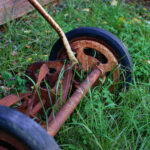
![9 Best Push Lawn Mowers of 2024 [Reviews]](https://www.lawnstarter.com/blog/wp-content/uploads/2023/11/Best-Push-Lawn-Mowers-150x150.jpg)